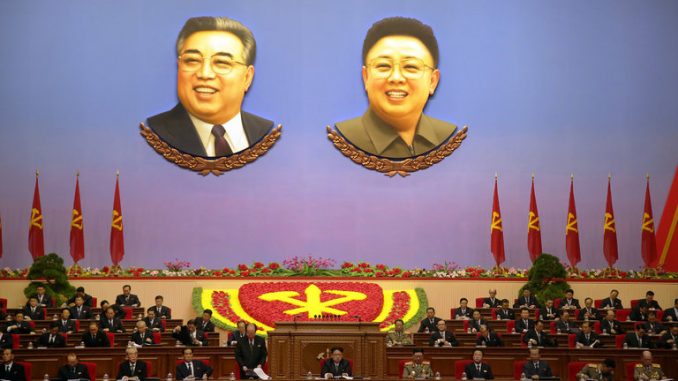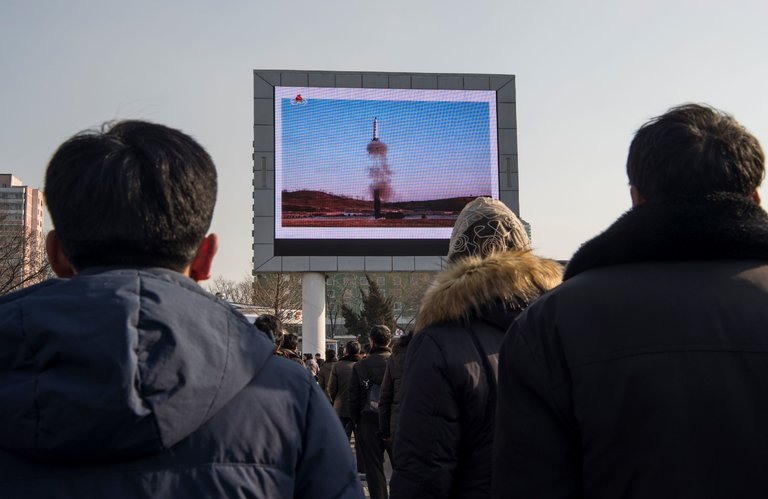
Above all, Beijing fears Kim regime’s collapse, sending millions of hungry, ill-educated North Koreans into China — and losing the strategic buffer it enjoys with South Korea and its US ally. But Kim’s erratic behavior has deeply upset Beijing. Increasingly, it sees Pyongyang as the source of the instability it fears. Top, Kim Jong-un 2016 Pyongyang speech below portraits of his predecessors – grandfather Kim Il-sung, left, and father Kim Jong-il. Below, big-screen tv images of North Korean missile launch being shown in Pyongyang last month.
“Since the early 1990s, American administrations have tried and failed to curb North Korea’s growing nuclear ambitions.
Over the past year, Kim Jong-un, the country’s leader, has relentlessly accelerated the effort to develop an intercontinental ballistic missile that can strike the US with a nuclear payload.
Two nuclear tests and 30 missile launches later, North Korea is closer than ever to putting that capacity in the hands of a leader
who seems to act impulsively, even irrationally, and may not be bound by the rules of deterrence.
What is to be done about Kim and the nuclear nightmare he inspires?
As Rex Tillerson travels to Asia this week for the first time as secretary of state,
his mission should be to build support for a plan to contend with this threat.
South Korea’s political turmoil — including the ouster last week of Park Geun-hye as president — only complicates Tillerson’s already difficult task.
There is no quick military fix.
Much of North Korea’s nuclear complex is concealed underground, inside mountains or in places unknown to United States intelligence.
Meanwhile, the country is making rapid progress with mobile missiles powered by solid rocket fuel that can be rolled out of hiding and prepared for launch in minutes.
Similarly, most experts believe cyberweapons can at best disrupt and delay — but not defeat — Pyongyang’s missile program.
Even if we had an effective pre-emptive strike capacity, the consequences of using it could be prohibitive.
Pyongyang possesses thousands of artillery pieces 30 miles from Seoul.
Just one retaliatory salvo could decimate South Korea’s capital.
That leaves a negotiated settlement that first freezes and then rolls back North Korea’s nuclear program,
with inspectors to carefully scrutinize compliance — much as we did with Iran.
While a monitored freeze would leave North Korea’s existing capacity in place, it would
- stop the testing critical to further progress,
- enhance our knowledge of the program
- and create time and space to pursue a comprehensive agreement.
Such an agreement could include the peace treaty Pyongyang wants, provided it effectively denuclearizes.
[ Again, that sounds great — but how is such a result ever going to come to pass —
especially when Trump moronically criticizes and de-legitimates the Iran agreement and process. ]
Kim’s grandfather and father both proved willing to negotiate — they saw the nuclear program as a bargaining chip.
Kim Jong-un has [ so far ] refused —
to him, nuclear weapons are the only insurance policy against regime change.
What, if anything, can change his strategic calculus?
The answer is a comprehensive, sustained and relentless international pressure campaign —
led by the United States, South Korea, Japan and China —
that raises the price of Kim’s obstinacy to the point he believes his survival is in jeopardy.
The Obama administration started such a campaign that continues today, though less intensively.
Its most visible component is China, North Korea’s largest trade and investment partner.
By curbing imports from North Korea — as it did with coal, which generates one-third of Pyongyang’s export revenues —
Beijing can exert unique leverage, denying Kim resources to fund his nuclear pursuits and buy off elites.
Until recently, Beijing resisted using that leverage.
It feared inciting the Kim regime’s collapse,
sending millions of North Koreans into China —
and losing the strategic buffer it enjoys with South Korea and its American ally.
But Kim Jong-un’s erratic behavior has deeply upset Beijing;
increasingly, it sees Pyongyang as the source of the instability it fears.
President Obama emphasized to President Xi Jinping of China that
North Korea’s nuclear program is now a core concern of the US, just as Taiwan is to China.
He made clear we would take every necessary step to protect ourselves and the allies we are sworn to defend,
notably by deploying missile defense systems like Terminal High Altitude Area Defense system, or THAAD,
which, while not aimed at China, clearly unnerve it.
If Beijing wants to pre-empt additional defensive steps, it must do more to bring Pyongyang to real negotiations.
Its recent decision to curb coal imports is a good start.
The second component of the pressure campaign has been less visible, but just as vital.
Working in weekly coordination with South Korea and Japan, the US identified and then sought to sever
the few political, economic and diplomatic ties that North Korea has had around the world.
Quietly but systematically, we went from country to country in Asia, Africa, the Middle East and Europe.
We pressed each to
- eject North Korean guest workers whose remittances go not to their families but to help fund the military, and diplomats engaged in illicit commercial activities;
- to deny landing rights to Air Koryo, the national airline, and porting rights to North Korea’s ships;
- to cut off or downgrade diplomatic relations;
- and to aggressively enforce and even go beyond sanctions authorized by the United Nations Security Council.
To date, our efforts have cut in half high-level North Korean exchanges with other countries
and possibly deprived North Korea of several hundred million dollars in revenues.
Tillerson should make clear that the United States will continue this dogged, daily diplomacy for the purpose of bringing North Korea back to credible negotiations.
But he will have to grapple with the likelihood that post-impeachment elections in South Korea this May
will empower a new leadership with a much more lenient approach toward Pyongyang.
And he will have to contend with China pressuring Seoul during the election campaign to back away from deploying THAAD.
His saving grace MAY be Kim Jong-un’s inability to resist a new round of provocative actions.
In the end, North Korea’s conduct may change only when its leadership does.
That is most likely to happen from within.
Kim Jong-un’s internal campaign of terror —
in which even the highest-ranking officials are not safe from execution or assassination —
increasingly risks provoking his overthrow.
Regime change could also mean regime collapse and a free-for-all to control the nuclear weapons … “
REPEAT
Regime change could also mean regime collapse — and a free-for-all to control the nuclear weapons.
And those are possibilities the US elite has to start considering — so it can, perhaps albeit unlikely, figure out a way to forestall them.
Source: Will Rex Tillerson Pass North Korea’s Nuclear Test? – The New York Times
